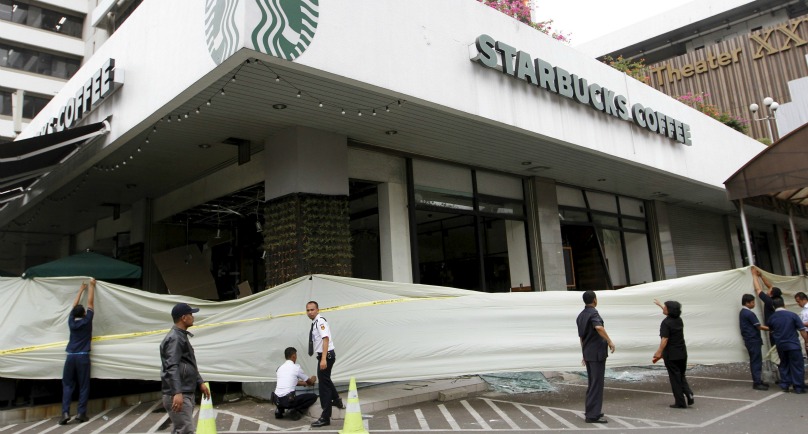Image: Workers set a cordon to enclose a cafe after it received damage following a gun and bomb attack in central Jakarta January 14, 2016. REUTERS/Garry Lotulung
![]()
By Randy Fabi and Fergus Jensen
JAKARTA (Reuters) – Indonesian police arrested three suspected militants in a pre-dawn raid and hunted down others across the country on Friday, a day after an attack by Islamic State suicide bombers and gunmen in the heart of the Southeast Asian nation’s capital.
Just seven people were killed in Thursday’s late-morning siege near a busy shopping district despite multiple blasts and a gunfight, and five of the dead were the attackers themselves.
Nevertheless, it was the first time the radical group has targeted the country with the world’s largest Muslim population, and the brazenness of the attack suggested a new brand of militancy in a country more used to low-level strikes on police.
Police chiefs across the country were put on high alert, some embassies in Jakarta were closed for the day and security was stepped up on the resort island of Bali, a draw for tourists from Australia and other Asian countries.
Chief security minister Luhut Pandjaitan confirmed media reports that three people suspected of plotting an attack were arrested at a house in the city of Depok, just south of Jakarta.
However, Metro TV quoted Depok’s police chief as saying that the men – which it described as a bomb-maker, a firearms expert and a preacher – were not linked to the Jakarta attack.
Raids were also underway across other parts of the populous island of Java and on other islands to round up suspected militants.
“Now we are sweeping in and outside Java, because we have captured several members of their group, and have identified them,” National Police spokesman Anton Charliyan said.
Returning to the area outside Jakarta’s oldest department store, Sarinah, where Thursday’s attack unfolded, the city’s police chief said the rise of Islamic State was a cause for serious concern.
“We need to strengthen our response and preventive measures, including legislation to prevent them … and we hope our counterparts in other countries can work together because it is not home-grown terrorism, it is part of the ISIS network,” Tito Karnavian said, using another acronym for the Syria-based group.
Pandjaitan, the security minister, said his office was working with parliament to make changes to legislation that would allow preemptive arrests.
Experts agree that there is a growing threat from radicalised Muslims inspired by Islamic State, some of whom may have fought with the group in Syria. However, they said the low death toll on Thursday pointed to the involvement of poorly trained local militants whose weapons were crude.
An Indonesian and a man of dual Canadian-Algerian nationality were killed along with the attackers. Twenty-four people were seriously wounded, including an Austrian, a German and a Dutchman.
Islamic State said in its claim of responsibility that “a group of soldiers of the caliphate in Indonesia targeted a gathering from the crusader alliance that fights the Islamic State in Jakarta”.
Police confirmed that Islamic State was responsible and named an Indonesian militant, Bahrun Naim, as the mastermind.
They believe Naim leads a militant network known as Katibah Nusantara and is pulling strings from Raqqa, Islamic State’s de facto capital in Syria.
“His vision is to unite all ISIS supporting elements in Southeast Asia, including Indonesia, Malaysia and the Philippines,” Jakarta police chief Karnavian said.
Islamist militants from those three countries have a record of working together and several Malaysians are known to have carried out suicide attacks in the Middle East.
ECHOES OF PARIS
Indonesia has seen attacks by Islamist militants before, but a coordinated assault by a team of suicide bombers and gunmen is unprecedented and has echoes of the sieges seen in Mumbai seven years ago and in Paris last November.
In a recent blog post, entitled “Lessons from the Paris Attacks”, Naim had urged his Indonesian audience to study the planning, targeting, timing, coordination, security and courage of the jihadis in the French capital.
Australian Attorney-General George Brandis, who was in Jakarta recently to bolster security coordination, told the Australian newspaper he had “no doubt” Islamic State was seeking to establish a “distant caliphate” in Indonesia.
The country had been on edge for weeks over the threat posed by Islamist militants, and counter-terrorism police had rounded up about 20 people with suspected links to Islamic State.
There was a spate of militant attacks in Indonesia in the 2000s, the deadliest of which was a nightclub bombing on Bali that killed 202 people, most of them tourists.
Police have been largely successful in destroying domestic militant cells since then, but officials have more recently been worrying about a resurgence inspired by Islamic State.
Many experts believe that Indonesia, a vibrant democracy where the vast majority of Muslims practise a moderate form of Islam, is not likely to be tipped into a cauldron of militancy.
“It is true that a tiny number of the country’s army of poorly educated, desperately underemployed young men are attracted to the guts-and-glory narrative spun by ISIS,” author and long-time Indonesia foreign correspondent Elizabeth Pisani wrote in the Financial Times. “But their discontent is based on economic rather than religious or political marginalisation.”
(Writing by John Chalmers; Editing by Robert Birsel)
Copyright 2015 Thomson Reuters. Click for Restrictions.


